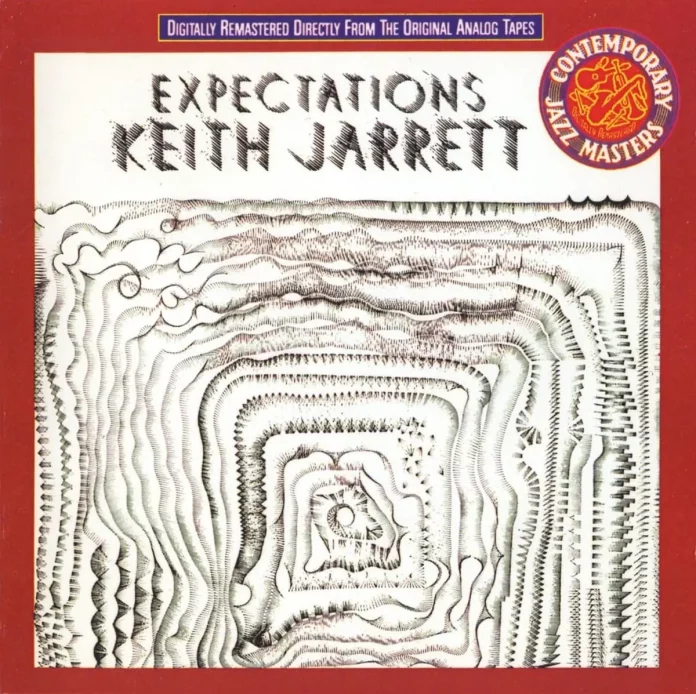The Expectations reissue maintains the quality we have come to expect from Columbia’s Contemporary Jazz Masters series, mangling the track listing and playing times in a way that should make life very interesting for radio presenters. There are further challenges in the insert, which contains a fine note by Chip Stern but makes no mention of the fact that this issue omits the original opening track Visions and does not trouble itself with recording location or date. I’ve given the correct running order, probable location and approximate date below.
By comparison with The Cure and other recent Jarrett work, and in keeping with the tenor of the time, Expectations presents a fusion of styles. However, although Jarrett had earlier dabbled with electric piano, and although this session is lacerated by the crude rock guitar of Sam Brown, it reflects Jarrett’s interest in the non-electric aspects of the idiom.
This was one of Jarrett’s first responses to the pluralistic enthusiasms of the early seventies, but it stands in polar contrast to the high-wattage genre-crunching of the Mahavishnu Orchestra. Jarrett preferred to operate within a subtler dynamic range, to parcel different genres into different tracks, and to work with far closer reference to jazz’s traditions and materials.
Also, although it may technically be fusion, the music reflects the composer’s stylistic preoccupations. Rather than rock, jazz and more rock, we hear elements of gospel music, Ornette Coleman and free-playing, the European concert legacy and the hard bop piano lexicon. The result is a still coalescing picture of Jarrett’s highly personal style. Occasionally there is a self-indulgence which will try the uncommitted listener, but Jarrett’s ecstatic outpourings on Common Mama are as extraordinary as anything he has recently produced.
The Cure is unlikely to attain the historical altitude of Expectations, since it is essentially another chapter in Jarrett’s rekindled affair with ‘tunes’. Jarrett often seems to provoke undiscriminating adulation in many listeners, but the ludicrous reception accorded to the title track, a largely uneventful 10-minute meditation on a four-bar pentatonic riff, calls into question the value of all Jarrett’s work.
However, encouraged perhaps by the ritual atmosphere and Jarrett’s own vocal encouragements, the most sceptical listener ought to find himself gently captivated by the suppleness, spontaneity and intensity of Jarrett’s readings of standards. Only on Things – perhaps significantly a blues – does he seem unable to make the most of the form, rendering a potentially strong vehicle weedily ineffective. But the good – some 57 minutes of it – suggests this is one of the year’s better piano trio records.
Discography
Keith Jarrett – Expectations
Common Mama; The Magician In You; Roussillon; Expectations; Take Me Back; The Circular Letter (For J.K.); Nomads; Sundance; Bring Back The Time When (If); There Is A Road (God’s River) (76.54)
Collective personnel: Jarrett (p/ss/org/pc); Charlie Haden (b); Paul Motian (d); Sam Brown (elg); Dewey Redman (ts); Airto Moreira (pc). Plus unknown strings and brass. Probably New York, October 1971.
(Columbia 467902 2)
The Cure
Bemsha Swing; Old Folks; Woody ’n You; Blame It On My Youth; Golden Earrings; Body And Soul; The Cure; Things Ain’t What They Used To Be (77.38)
Jarrett (p); Gary Peacock (b); Jack DeJohnette (d). New York Town Hall, April 21, 1990.
(ECM 1440)
















